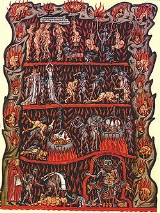
and punishment
in the afterlife
. Religion
s with a linear divine
history often depict hells as endless. Religions with a cyclic history
often depict a hell as an intermediary period between incarnation
s. Typically these traditions locate hell under the Earth
's external surface and often include entrances to Hell from the land of the living. Other afterlife destinations include Heaven
, Purgatory
, Paradise
, and Limbo
.
Other traditions, which do not conceive of the afterlife as a place of punishment or reward, merely describe hells as an abodes of the dead – a neutral place located under the surface of Earth (for example, see sheol
and Hades
).
Tros Anchisiade, facilis descensus Auerno: Noctes atque dies patet atri ianua Ditis; Sed reuocare gradum superasque euadere ad auras, Hoc opus, hic labor est. Pauci, quos aequus amauit.![]()
Quisque suos patimur manis.![]()
Now the devil that told me I did wellSays that this deed is chronicled in hell.![]()
You, mistress, That have the office opposite to Saint Peter, And keeps the gate of hell!![]()
Just as seeing Heaven's light gave him an awareness of God's presence in all things in the mortal plane, so it has made him aware of God's absence in all things in Hell.![]()
What will you do in a world where the Holy Spirit never strives; where every soul is fully left to its own depravity; and where there is no leisure for repentance, if there were even the desire, but where there is too much present pain to admit repentance; where they gnaw their tongues with pain, and blaspheme the God of heaven?![]()
An immortality of pain and tears; an infinity of wretchedness and despair; the blackness of darkness across which conscience will forever shoot her clear and ghastly flashes, —like lightning streaming over a desert when midnight and tempest are there; weeping and wailing and gnashing of teeth; long, long eternity, and things that will make eternity seem longer,— making each moment seem eternity,— oh, miserable condition of the damned!![]()
Many might go to heaven with half the labor they go to hell, if they would venture their industry the right way.![]()
The longer men sin, the more easily they can; for every act of transgression weakens conscience, stupefies intellect, hardens hearts, adds force to bad habits, and takes force from good example. And, surely, there is nothing in such associations; as wicked affinities will insure to the sinner in the future state, to incline him to repentance.![]()

